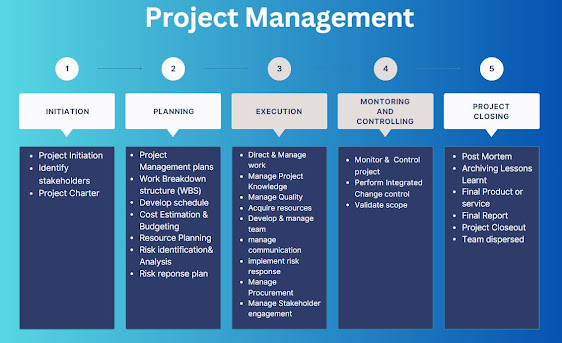Introduction:
Project management is a process that involves a series of planned and controlled activities aimed at achieving specific goals and objectives within a defined timeframe.
To effectively manage a project, project managers follow a five-phase approach, which serves as a roadmap for the project’s lifecycle.
These five phases in project management are initiation, planning, execution, monitoring and controlling, and closing.
Initiation:
- The first phase of project management is initiation.
- This phase involves defining the project’s objectives and determining whether or not the project is feasible.
- The project manager works with the stakeholders to identify the project’s scope, budget, timeline, and potential risks.
- The project charter is created during this phase, outlining the purpose of the project, the stakeholders involved, the project’s goals and objectives, and the project’s scope.
Planning:
- Once the project has been approved, the project manager moves on to the planning phase.
- This phase involves developing a detailed project management plan that outlines how the project will be executed.
- The project manager creates a project schedule, defines the project team, and identifies the resources required.
- Additionally, the project manager creates a risk management plan to identify potential risks and develop strategies to mitigate those risks.
Execution:
- The execution phase is where the actual work of the project takes place.
- The project manager and the project team carry out the project’s tasks and activities as defined in the project plan.
- The project manager oversees the project team, manages the project schedule, and ensures that the project is on track.
- The project manager must also communicate regularly with stakeholders to keep them informed of the project’s progress.
Monitoring and Controlling:
- The monitoring and controlling phase involves tracking the project’s progress and making any necessary adjustments to ensure that the project stays on track.
- The project manager monitors the project’s performance, compares it to the project plan, and identifies any variances.
- If any issues arise, the project manager works with the project team to make adjustments and keep the project on track.
Close Out:
- The final phase of project management is close Out / Closing.
- This phase involves completing the project and transitioning it to the stakeholders.
- The project manager works with the project team to ensure that all project tasks have been completed, and all deliverables have been met.
- Additionally, the project manager prepares a final project report and conducts a project review to identify any lessons learned that can be applied to future projects.
In conclusion, project management is a complex process that requires careful planning and execution. By following the five phases of project management - initiation, planning, execution, monitoring and controlling, and closing - project managers can ensure that their projects are completed on time, within budget, and meet the objectives of all stakeholders.
By applying the appropriate project management methodologies, tools, and techniques, project managers can deliver successful projects that exceed stakeholders’ expectations.






No comments:
Post a Comment